
Opinions
19:03, 18-Jan-2019
Opinion: Theresa May's call for unity offers little
Tom Fowdy
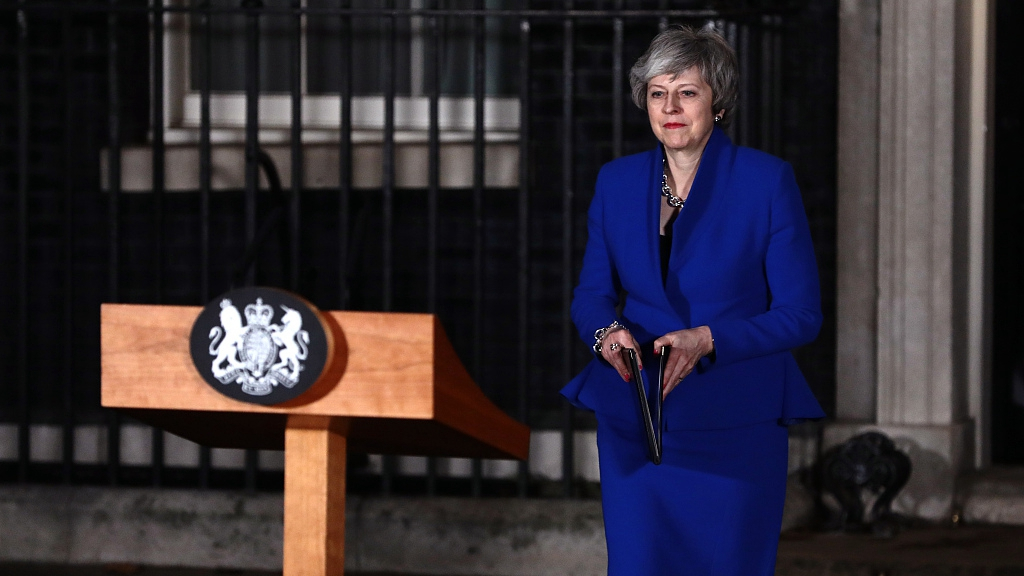
Editor's note: Tom Fowdy is a UK-based political analyst. The article reflects the author's views, and not necessarily those of CGTN.
After a week of incredible drama following the Parliamentary defeat of her deal, Theresa May has, for now, survived.
As anticipated, the vote of no confidence tabled against her by the Labor Party failed to dissolve her government, simply because many Conservative MPs are not prepared to risk them a shot at a general election. On the matter of Brexit of course, that offers no consolation.
With the government intact and the deal rejected, a state of limbo and uncertainty has emerged; the UK is seemingly stuck in a position of Brexit purgatory, as the threat of a no-deal exit looms.
May, however, is vowing to shoulder on. Despite being somewhat discredited, even to her own party, she called upon opposition parties for a show of national unity in the aim of holding talks on finding a way to move forwards, perhaps in the hope of even attempting to salvage the agreement struck with Brussels.
Such a proposal isn't likely to achieve anything. Theresa May's handling of the issue is simply not convincing, something that starts with her own party, never mind others.
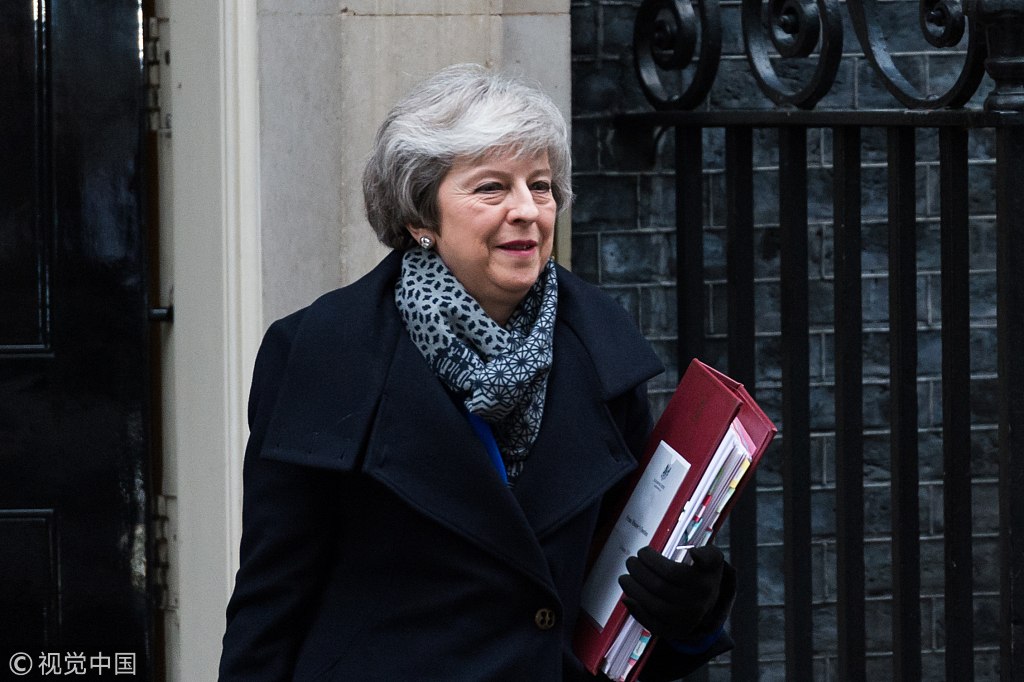
British Prime Minister Theresa May leaves 10 Downing Street in central London for the weekly PMQ session in the House of Commons, January 16, 2019. /VCG Photo
British Prime Minister Theresa May leaves 10 Downing Street in central London for the weekly PMQ session in the House of Commons, January 16, 2019. /VCG Photo
With the political stakes surrounding Brexit so high and so polarized, as well as Labor's rebuttal of propping up what they consider a failing government, the situation comes across as if the Prime Minister is asking the other parties to compromise on her behalf out of goodwill, rather than to offer any incentives to negotiate; weaponizing the threat of a no-deal whilst attempting to sell something others see as inherently against the national interest, as being somehow in the national interest, is just not a non-starter.
British parliamentary politics is known for its confrontational and adversarial approach, it stems from a set of conventions which dates back centuries, which has framed such politics in the light of a fierce rivalry, embedded in the symbolism of the House itself (hence the two leaders standing a sword's length from the other).
In a classic style depicted as “punch and judy” the government and the opposition content in for power in ways which descend to the cheap scoring of points. Throughout history, there have been few exemptions.
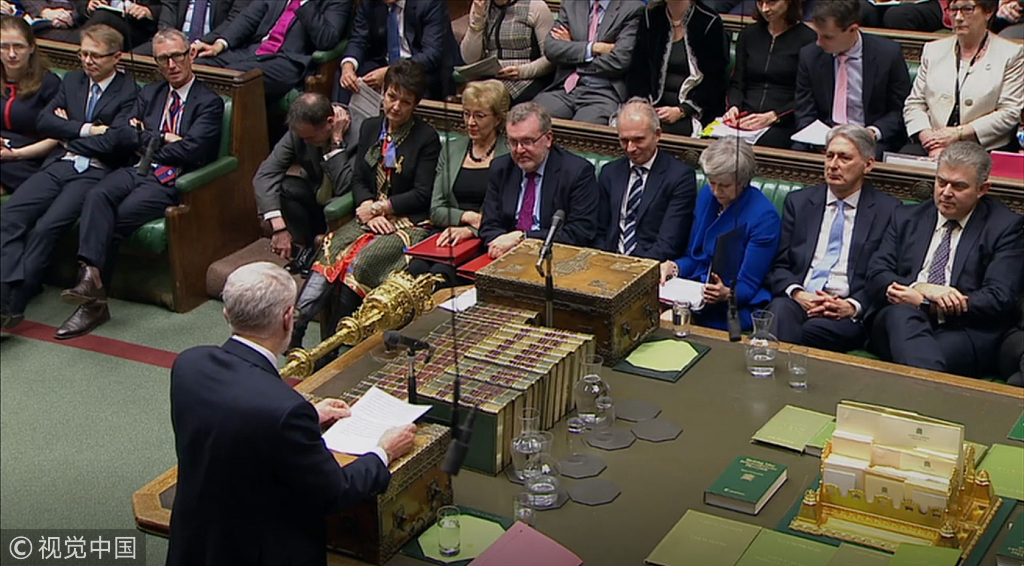
Labor leader Jeremy Corbyn speaks during Prime Minister's Questions in the House of Commons, London, January 16, 2019. /VCG Photo.
Labor leader Jeremy Corbyn speaks during Prime Minister's Questions in the House of Commons, London, January 16, 2019. /VCG Photo.
Only in the situation of a crisis which threatened the very nation itself, such as two world wars, was the major parties of the commons able to put their differences aside to unite in a pragmatic fashion.
Winston Churchill's coalition government saw the Conservatives and Labor rule together for most of the war, ideological differences could not compensate for the need to save Britain itself.
Whilst of course never comparable to World War II, there is nevertheless an irony within Theresa May's call for unity, not least given the rapidly unfolding crisis of Brexit.
Despite the risks posed to the country by a “no deal” scenario and the lack of an alternative proposal to offer to Brussels, the highly divisive nature of the issue is likely to promote increased confrontation, than pan-partisan compromise.
The idea that Theresa's Brexit should be advocated in the end to prevent a national disaster cannot convince voices who believe the idea of a departure from the EU is a fundamentally bad idea in the first place.
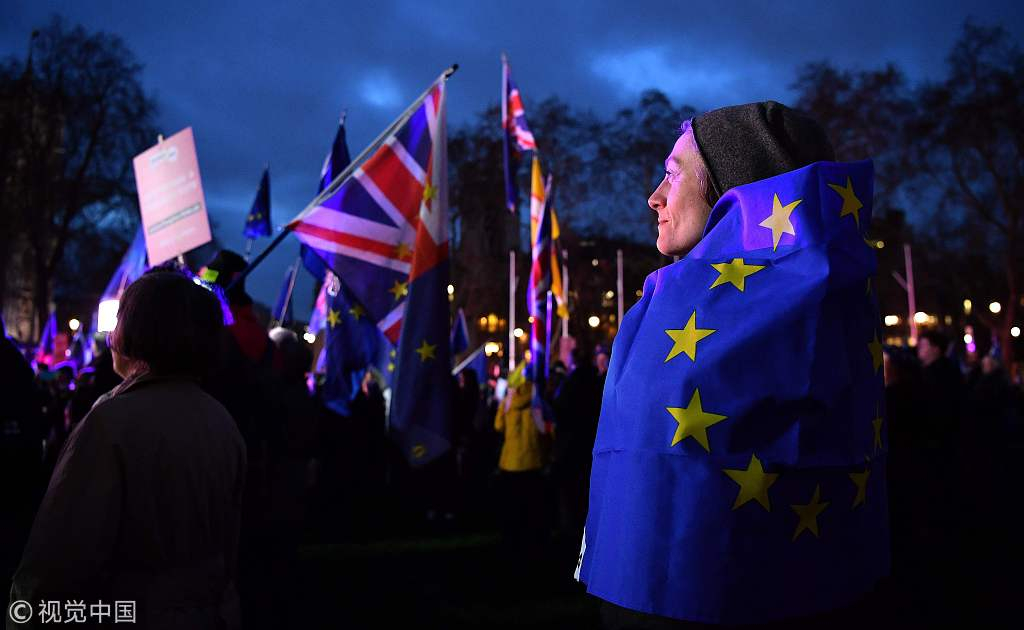
An anti-Brexit activist wrapped in an EU flag stands with other protesters as they demonstrate outside of the Houses of Parliament in central London, January 15, 2019. /VCG Photo
An anti-Brexit activist wrapped in an EU flag stands with other protesters as they demonstrate outside of the Houses of Parliament in central London, January 15, 2019. /VCG Photo
Such people, particularly the Liberal Democrats, the Scottish National Party (SNP) and many Labor backbenchers, are vesting their solution in a 2nd referendum and a bid to end Brexit altogether, not to concede in desperation to their opponent. They won't endorse Theresa's deal until she agrees to that.
Yet those voices would be marginal if the Labor leadership, who has resisted the temptation to push for scrapping Brexit, could agree with Theresa May. Unsurprisingly, they can't. From a political perspective, why should they?
Corbyn perceives a weak, bitterly divided and clueless government that is collapsing on an inability to deliver its flagship issue. If Corbyn was to seek a common good with 10 Downing Street, it would be to give his opponents a get out of jail free card and nothing in return.
The logic of it is ludicrous. The Labor leadership feels they have everything to gain by allowing Theresa May to implode, hoping a general election can be forced. Then, Corbyn could set out his own vision for Brexit.
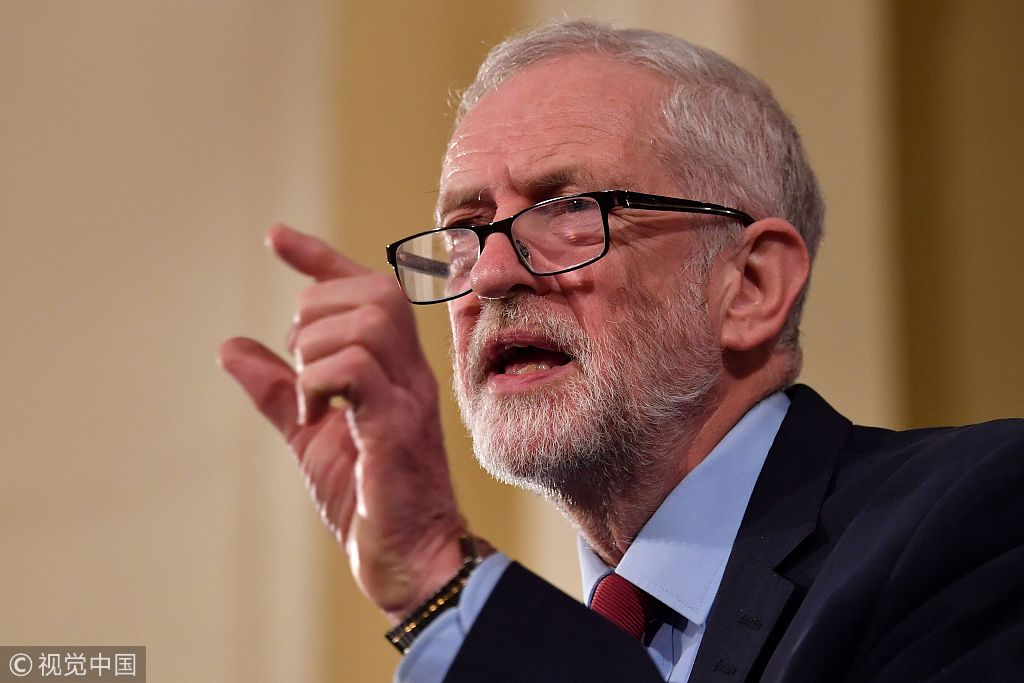
Britain's opposition Labor Party leader Jeremy Corbyn gives a speech in Hastings, southeast England, January 17, 2019. /VCG Photo
Britain's opposition Labor Party leader Jeremy Corbyn gives a speech in Hastings, southeast England, January 17, 2019. /VCG Photo
Thus, Theresa May's indirect attempts to use the threat of a “no deal” as a weapon isn't really going to buy anyone. She can't win in her own party with this either. Such a move pleases the Eurosceptic wing, but riles moderates who have doubts about it.
May claims the aspect of a no-deal is out of her control, but one may more accurately question what is in her control right now? It seems highly unlikely that other parties, who have political gains to lose, would rally around her during a time where the political walls are closing in.
The defeat of her deal has already seen the Brexit center ground collapse, with many very set on attempting to push the 2nd referendum, she's not going to be able to re-create it now.
(If you want to contribute and have specific expertise, please contact us at opinions@cgtn.com.)

SITEMAP
Copyright © 2018 CGTN. Beijing ICP prepared NO.16065310-3
Copyright © 2018 CGTN. Beijing ICP prepared NO.16065310-3